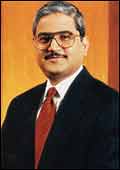






|
People
Unravelling Of "Giceos'
|

|
| RANA
TALWAR: too aggressive for Chairman Patrick Gillam |
It's a bad
time to be a CEO. And if you are India-born, and leading a troubled global
corporation, it can be worse still. In quick succession, two of the
best-known global Indian CEOs (GiCEOs) were eased out last fortnight.
Rakesh Gangwal, until recently believed to be ''the most talented
executive in the airline industry'', was forced to leave the top job at US
Airways after the airline's merger with United Airlines came a cropper.
The other equally distinguished executive to be ousted is Rana Talwar of
Standard Chartered Bank.
|

|
| RAKESH
GANGWAL: aviation's wonder-kid crash-land |
The 48-year-old Gangwal, a Kolkata-native and
an IIT-Kanpur alum, probably saw it coming. US Airways-the sixth largest
carrier in America-had been bleeding even before the September 11 attacks,
post which the losses worsened and Gangwal had to sack 11,000 employees.
The departure of Gangwal, who took over as CEO in 1998, is seen as the
last big event at an airline awaiting bankruptcy. Barely two years ago,
Gangwal was feted as a turnaround artist, having grown US Airways' market
cap from $800 million to $8 billion. Had he quit 10 days before he did, he
would have received $21 million as a severance package. With the merger
falling through, Gangwal may have changed his mind. He now plans to pursue
a career in venture capital.
Talwar's resignation, on the other hand, was
totally unexpected. In fact, barely two days before his resignation, the
bank had denied any tension between its long-serving chairman Patrick
Gillam and the 53-year-old Talwar. If things came to a head, it was
because of Citigroup's (and Lloyds TSB's) reported interest in StanChart
for acquisition. Talwar, an ex-Citibanker himself, had an aggressive style
of management, which did not gel with Gillam's. For example, in 2000
Talwar had led StanChart's acquisition of Grindlays Bank, and also bought
Chase Manhattan's credit card business in Hong Kong. Talwar wanted
StanChart's East Asian operations to be run by locals, whereas Gillam
wanted to post people from the headquarters in London. Gillam was also
unhappy with Talwar's pay-for-performance philosophy. Conservatives won,
the radical lost. Too bad for StanChart.
Clean Log
|

|
| MICHAEL
MASCARENHAS: honourable exit |
Better late
than never. With just two days to spare before his retirement on November
30, the suspended Managing Director of Air India, Michael Mascarenhas,
received a clean chit from the Central Bureau of Investigation, which was
probing his alleged favouritism to a London-based general sales agent.
''Today, I feel vindicated,'' said Mascarenhas, who returned to work as MD
for one day on November 29. ''I am carrying my suspension letter like a
badge of honour.'' In May, the Ministry of Civil Aviation had made the
corruption charge and suspended Mascarenhas, who in turn slapped a
defamation suit against the ministry. It, however, took 188 days of
running round and several rounds of debriefing by the CBI before
Mascarenhas was exonerated. He has since withdrawn his defamation suit.
Air India may still be spiralling down, but Mascarenhas has bailed out
with his reputation intact.
Moving On
|

|
| INGO
SCHWEDER: off to HK, but India's on his mind |
He mid-wifed
India's first destination hotel and the first luxury spa. And now Ingo
Schweder, Managing Director of Mandarin Oriental Hotels India, is
moving to Hong Kong to head the chain's spa business world wide. The half-Parsi-half-German
isn't severing his links with the country, though. He plans to oversee the
hotel's spa at Tehri Garwhal from Hong Kong. ''India has been fantastic
for me, I always felt part of the society here,'' says the Rolling Stones
fan and hand-gliding enthusiast, who also owns a Marilyn Monroe portrait
by Andy Warhol. Lured into India by the Oberois for their Raj Vilas and
Cecil (Shimla) projects, Schweder decided to stay on and do a spa project
for the Rafael Group, which recently was acquired by Mandarin Oriental.
Schweder liked India so much that for nearly a year he fought the
relocation. Having given in, he plans to make up with frequent trips to
the country.
|

